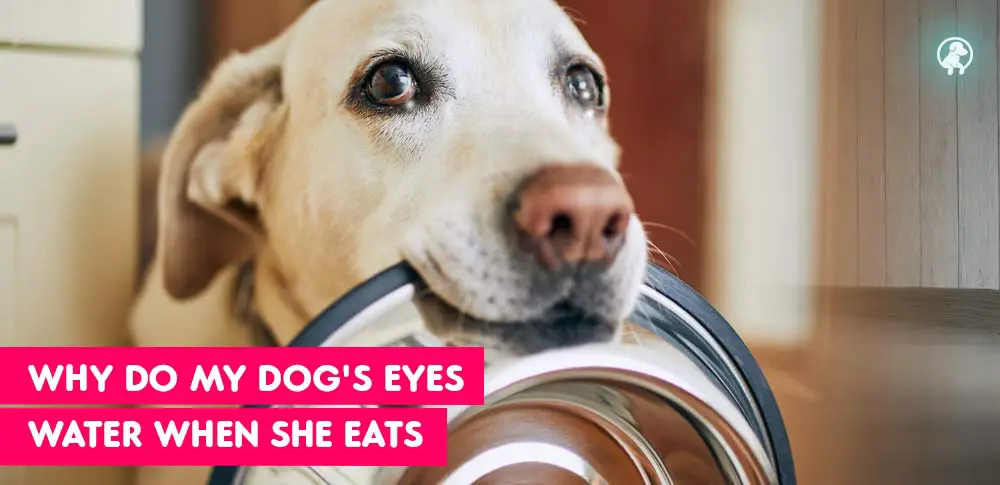Meal time is one of the favorite times for doggies. However, have you noticed your dog’s eyes water when she eats?
In this post, we’ll be talking about the common reasons your dog’s eyes water when she eats.
Why do my dog’s eyes water when she eats
A dogs’ eyes may water due to sensitivity to a particular food ingredient, problem with his tear ducts, experiencing neck pain or having difficulty swallowing.
We discuss below the reasons for this condition
Your dog may be too sensitive to the food
Your dog’s eyes may water during mealtime because he may be sensitive to certain ingredients in the food you’re serving.
You may need to answer these questions:
- What kind of food do you serve your dog?
- Wet or dry dog food?
- Is your dog’s meal appropriate for his age and requirements?
- How long have you been giving him such?
- These are some of the questions you need to answer.
You may want to change your puppy’s diet, perhaps to a hydrolyzed diet such as royal canin, for eight weeks to see if the tearing continues and to rule out food sensitivities.
There may be some ingredients in the food that are causing pain to your dog.
This may be the reason he is tearing up. He is uncomfortable eating something inside of the food that he may be allergic to.
You may want to take your pup to the vet if, after these home trials, the tearing continues so that his tear ducts, oral cavity, and throat may be examined thoroughly.
Your dog has a bad tooth
Why are Fido’s eyes watering anytime you bring his food?
Could it be possible that he has a tooth infection or gum disease?
- Tooth Root Abscess: Tooth root abscess, which is the commonest tooth infection in dogs, is a condition where bacteria colonizes the root canal of a tooth. Once infected, the tooth becomes inflamed and causes oral pain to the dog.
- Gum Disease: Also, when bacteria and leftover food particles collect along the gum of your pup, it may irritate the gum and the oral cavity, causing what is often known as gum disease.
- Tonsillitis: Tonsils are a collection of lymphatic tissue around the oral cavity, usually behind the tongue or throat.
When these tissues are inflamed, perhaps due to bacterial or viral attacks, they tend to swell and cause pain to the dog.
If your dog has any of these conditions, it may preclude him from enjoying his meals.
Eating becomes a burden, and you may often or occasionally catch him with a watery eye while he gulps his food.
Please pay attention to your dog’s behavior while he eats. If you notice any uncomfortability or feeling of pain as he gobbles up his food, you may want to do an oral examination yourself.
You may have to lift his upper lip high enough to peek into your dog’s mouth and check for any abnormalities or swellings to rule out the above conditions.
If your dog continues this behavior after the examination, take him to see the vet so expert hands can medically examine him.
Your dog may be experiencing neck pain
If your dog tears up while ingesting his meals, you should watch him closely while he eats and examines him for pain.
You may decide to touch your doggy’s neck and the surrounding area and watch his response to your touch.
It doesn’t have to be a jarring touch for your dog to show hurt, it may be a subtle motion from your hand, and he winces.

The pain might arise from a strain on the muscles or a herniated disc.
It may be challenging to diagnose, so if you do an examination and your pooch’s eyes still water when he eats, you should take him to the vet.
Your dog is having difficulty swallowing
Dysphagia is a condition in which swallowing just about anything comes with pain.
Difficulty in swallowing may be caused by several underlying factors, such as an injury to the esophagus or a throat infection.
This could make your doggy’s eating so burdensome that he has watery eyes when he munches his food.
GERD: GERD stands for gastroesophageal reflux disease. It occurs when the stomach produces a lot of acid such that it can go up into the esophagus and even into the mouth.
This often causes pain, a feeling of tightness, or a burning sensation around the throat. This can be discomforting for your doggy, especially when he eats, and can cause him to tear up.
GERD may be diagnosed by your vet. Your pooch may be prescribed antacids and other drugs to help lower his stomach acid levels.
Your dog has a problem with his tear ducts
Excessive tearing during eating may be a reflex in which the sight of food stimulates the tear glands to produce tears. It is very much like when we have a runny nose while eating.
Excessive tearing or epiphora could also result from a blockage in the ducts, which drain tears from the eyes.
- Rhinitis: Your dog’s eyes could be watering due to infections such as rhinitis or sinusitis, which is the inflammation of the mucous membranes in the nose.
It could be accompanied by skin irritation and reddening around the eyes. You should check with the veterinarian to ascertain the cause of his tearing while eating so he can get better. - Conjunctivitis: This is the inflammation of the conjunctival tissue. The tissue isn’t usually seen in healthy pups, but with the infection, the eyes swell, redden and secrete a discharge.
When there is a block in the tear ducts, it may lead to this condition. The eyes begin to discharge tears excessively. Conjunctivitis is easy to treat; if your dog has it, you should take him to the vet. - Corneal ulcer: The cornea is the transparent membrane that covers the eyeball. Corneal ulcer is also called the scratched cornea found in very playful dogs.
Dogs who play a lot with other pets, like cats, or who play in thick bushes can get a scratched cornea.
The tearing resulting from this comes with other symptoms, such as swelling, eye-pawing, and excessive blinking.
If you see these signs in your dog, endeavor to contact the veterinarian.
Your dog has dirt in his eyes
If, after a busy day in the garden, digging, playing, and picking up dirt, your pooch’s eyes water when he eats, then he probably has dirt in his eyes.
The tearing is usually temporal and goes away with time.
However, if your furry companion continues to tear up while he eats, it may be other reasons different from this.
Your dog is imitating you
Have you had a breakup recently or been in a sad mode lately? Has your dog seen you snuggle your sheets, eat and cry all day?
Chances are your four-legged companion has been watching you with keen eyes and has got the idea that you’re sad.
Your doggy may have watery eyes when he eats because he has seen you do this, and he wants to show you that he, too, feels your sadness.
He wants to share in your emotion and help you through your grieving period. If this is the situation, there isn’t much to worry about.
What to do if your dog’s eyes water when he eats?

Self-examine your dog
The first thing you should do when you notice water in your dog’s eyes is to examine his eyes and the areas around it to check if there are any particles or irritants that may be causing his eyes to water.
If you notice any particles, dirt, or dust in his eyes, you should take a clean towel and gently wipe his eyes to remove them.
You should also inspect his mouth, teeth, and nose for any infection, be it rhinitis, corneal ulcer, conjunctivitis, or any other kind of eye infection.
Especially if you notice he continuously blinks, paws at his eyes, if there are swellings or if the eyes are reddened.
Change your dog’s meal
Maybe something in your puppy’s food causes his eyes to water.
Something he is allergic to that’s in the food.
You should change your dog’s diet for weeks and observe your dog’s condition to see if the tearing stops.
Consult your vet or a dog dietician to know the best diet for your doggy.
You may want to try him on soft meals as since he may have problems chewing dry hard meals.
Consult an expert
If your dog’s tearing continues even after examination and a change in diet, you should take him to see a vet so he can be medically examined in case of an infection and be given proper treatment.



